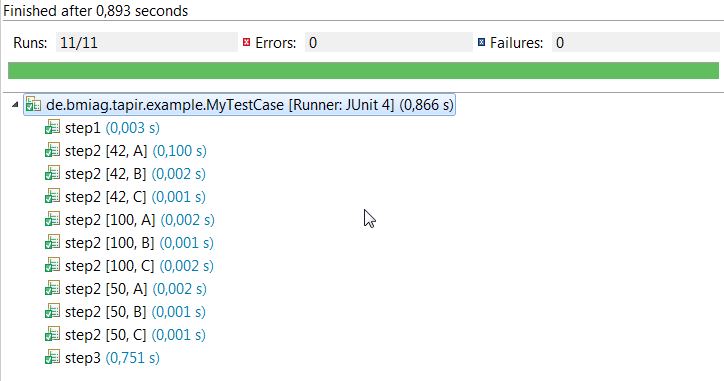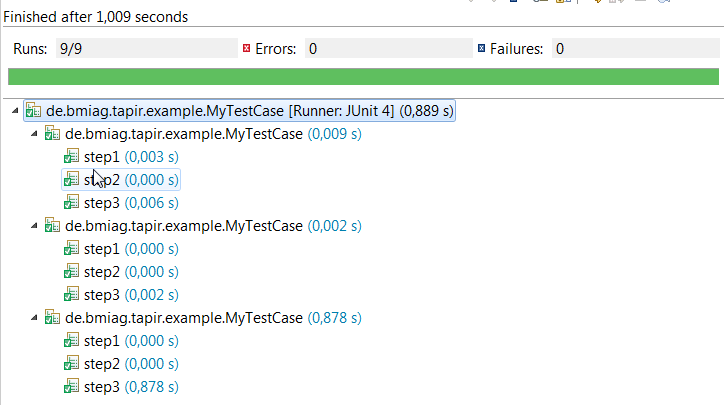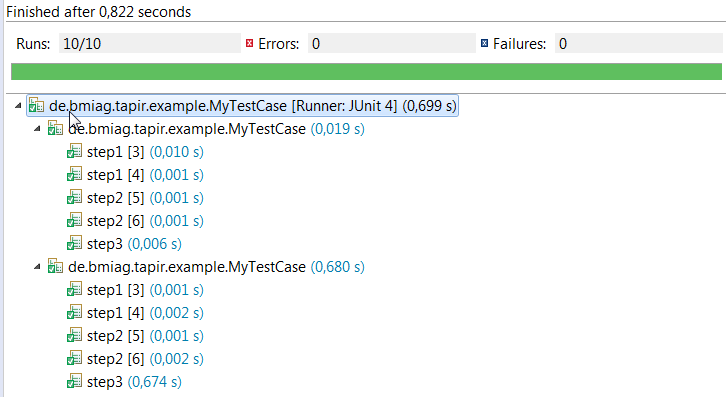-
Changes in Version 3.6.2 (2021-01-22)
Changes in Version 3.5.0 (2020-06-04)
Changes in Version 3.4.2 (2020-03-26)
Changes in Version 3.3.1 (2019-08-22)
Changes in Version 3.3.0 (2019-01-09)
Changes in Version 3.2.1 (2018-12-21)
Changes in Version 3.2.0 (2018-08-27)
Changes in Version 3.1.1 (2018-06-29)
Changes in Version 3.1.0 (2018-03-27)
Changes in Version 3.0.0 (2018-02-20)
Data Injection
Separating your tests from the test data helps to increase maintainability. It is even possible that developers can add further data to the tests without having actually to worry about how the tests work. The tapir Execution module comes with two annotations to help you with this task.
<dependency>
<groupId>de.bmiag.tapir</groupId>
<artifactId>tapir-execution</artifactId>
</dependency>
The annotations are @Parameter and @IteratedParameter. They can be used to inject data into your test cases.
Parameter
You can use the Parameter annotation to annotate fields or parameters of steps in your test classes.
@TestClass
class MyTestCase {
@Parameter
String param
@Step
def void step1(@Parameter int param1, @Parameter int param2) {
}
...
}
The parametrization of the annotation itself determines which method provides the data. There are three possibilities, which are detailed below. In each case, the method’s return type has to be compatible with the annotated parameter or field. The provider method for param must return a String and the provider methods for param1 and param2 must return an int.
Unparameterized
If you don’t parameterize the annotation, the data provider method is derived from the test step, the field and the parameter and must be provided by the test class. In the above example, you would have to implement three methods. Annotated fields get a method with the name of the field and the suffix Parameter. Annotated parameters get a method with the name of the test step and the parameter name with the suffix Parameter.
@TestClass
class MyTestCase {
@Parameter
String param
@Step
def void step1(@Parameter int param1, @Parameter int param2) {
}
override paramParameter() {
...
}
override step1Param1Parameter() {
...
}
override step1Param2Parameter() {
...
}
}
Value or method
The name of the provider method can be specified with the attributes of the annotation value or method (which is just an alias for value). This allows also to use the same provider method for different parameters and fields.
@TestClass
class MyTestCase {
@Parameter("providerMethod")
String param
@Step
def void step1(@Parameter(method = "providerMethod") int param1) {
}
override providerMethod() {
...
}
}
providerClass
Although the two methods above give you already an approach to separate the test data and the test cases, it might be a good idea to separate them even further. We suggest to write dedicated data provider classes, which are only responsible for delivering the data for your test cases. This allows also to reuse the same data through multiple tests. You can use the attribute providerClass of the Parameter annotation to specify another provider class. If you use such external data provider classes, they must be available in the Spring context. It is usually sufficient to annotate them with Spring’s Component annotation.
@Component
class MyDataProvider {
def String providerMethod() {
..
}
def int step1Param1Parameter () {
..
}
}
@TestClass
class MyTestCase {
@Parameter(providerClass=MyDataProvider, method="providerMethod")
String param
@Step
def void step1(@Parameter(providerClass=MyDataProvider) int param1) {
}
}
IteratedParameter
For some tests you don’t want to provide a single data entry, but rather a whole collection. The @IteratedParameter annotation works similar to the Parameter annotation, but it repeats test steps or even whole test classes for each element of the returned Iterable. This is why the test provider methods must return a compatible collection. For instance, if the annotated field is of the type String, then the provider method must return Iterable<String>.
Let us take a look at an example. The snippet below defined a test case with three test steps. The second step has a parameter annotated with IteratedParameter and the corresponding provider method returns three entries.
@TestClass
class MyTestCase {
@Step
def void step1() {
}
@Step
def void step2(@IteratedParameter int param1) {
}
@Step
def void step3() {
}
override step2Param1Parameter() {
#[42, 100, 50]
}
}
In this scenario, step1 is executed first. Then, step2 is executed for each element in the returned Iterable. This means that step2 is executed three times. Subsequently, step3 is executed. The following image shows you how the test execution looks in Eclipse. Note that the parameters of the steps are shown in brackets.

Now, what happens when you annotate more than one parameter of the same test step? The answer is, that tapir will execute the test step with all possible combinations by using the cartesian product.
@TestClass
class MyTestCase {
@Step
def void step1() {
}
@Step
def void step2(@IteratedParameter int param1, @IteratedParameter String param2) {
}
@Step
def void step3() {
}
override step2Param1Parameter() {
#[42, 100, 50]
}
override step2Param2Parameter() {
#['A', 'B', 'C']
}
}
This time step2 is executed nine times. The following image shows the complete execution in Eclipse.

So far we used the annotation only on step parameters. However, it is also possible to annotate fields. In this case the whole test class is executed for each element of the provided Iterable. The following example consists of three test steps, but only the field of the test class is annotated.
@TestClass
class MyTestCase {
@IteratedParameter
int param
@Step
def void step1() {
}
@Step
def void step2() {
}
@Step
def void step3() {
}
override paramParameter() {
#[42, 100, 50]
}
}
As the paramParameter method provides an Iterable with three elements, the test class MyTestCase is executed three times. The following image from the Eclipse IDE shows the execution.

It is also possible to combine annotations on fields and parameters. The following example demonstrates this. It consists of a field, which is annotated with IteratedParameter and three steps. Two of these steps have a parameter which is annotated with IteratedParameter as well.
@TestClass
class MyTestCase {
@IteratedParameter
int param
@Step
def void step1(@IteratedParameter int param1) {
}
@Step
def void step2(@IteratedParameter int param1) {
}
@Step
def void step3() {
}
override paramParameter() {
#[1, 2]
}
override step1Param1Parameter() {
#[3, 4]
}
override step2Param1Parameter() {
#[5, 6]
}
}
The following image shows the complete test execution in Eclipse.
